I was certain that there was no crime in Iceland. That's part of what makes it the perfect place to live outside for an entire summer: no crime, no darkness, and the most dangerous animals are bleating sheep. I was certain of all that until day 25 of my summer in Iceland, when I got robbed.
Naïveté is a trait that my mother and sister would say I have exhibited throughout my life. And I would protest: "I'm not ignorant but optimistic, ye of little faith!" Growing up, I clung to this faith because there wasn't enough room in our household for more neuroticism. "No one's going to break into the house while we're at the store. We can leave without setting the alarm." Or, "I don't need to put my backpack in my locker during assembly. Everyone has a computer, so why would they steal mine?" And Mom's response was always, "Sure, until it happens."
"There's no chance I'll get robbed in Iceland."
I had spent my first three weeks of the summer making slow progress towards the Westfjords, arguably the most beautiful region of the country and one of the most remote. In the early morning of Day 25, I was the sole passenger on the bus from Hellissandur to Stykkishólmur, the gateway to the fjord-fingers of Iceland's right hand. I arrived in Stykkish. before the coffee shop opened. I waited outside, and after a breakfast of green tea and skyr (a reprieve from my unseasoned, unsweetened oatmeal), I walked across the street to the campsite, picked a spot, and set my backpack down in the dewy grass.
Two minutes later, I came out of the bathroom to no sign of my pack — a quick panic. Nope, not stolen! It had just been moved a little and propped up against a nearby bush. My first thought was that someone had sat it up on its end so that its contents wouldn't get wet from the grass. Icelandic people are so considerate. To be sure, I checked to see if anything was missing. Nope! My tent, my journal, my e-reader, and my $30 ultralight aluminum trowel were all accounted for. That morning, I had only seen one other camper. When I came out of the bathroom, he was walking away from me, toward his tent, a short distance from my pack. And he had left before I noticed anything was missing.
It wasn't until I unpacked that I realized what that somebody had stolen: a small bag from the brain of my backpack that held my Icelandic cash, photos with my girlfriend, and my passport. And he had nabbed my third-most-valuable item, which was also stored in the single most accessible pocket: the sunglasses my mom had given to me as a graduation gift. Fuck that guy. There is no way he is Icelandic. Fuckin' tourists think they're hot shit.1
Peak naïveté is acting as if the worst possible outcomes are impossible. It might feel impossible, until it happens.
Instead of laying my backpack inside the vestibule of my tent like usual, I zipped it up inside and locked the zippers together with a little padlock my mom had forced me to pack. It was the first time I'd used it. Before trying to solve the problem, I walked next door to the local pool. Like everywhere else I'd been in Iceland, they encouraged me to pay with a card. I hadn't used cash once, which means the robber had taken the entire sum I had withdrawn at the Keflavík airport: the krona-equivalent of $100 USD. I paid the small fee for a day-pass at the pool and enjoyed a hot shower in an empty locker room and hours in the nearly deserted hot pots for it being a gloomy, dark, and misty afternoon.
I would probably need to report my passport stolen, and it would not be sensible to keep traveling in a foreign country without one. But to get a new passport, I would have to backtrack to Reykjavík and hope I could get an appointment at the embassy. But what's the worst that could happen? Realistically, I wouldn't need a passport for another two months, until my flight back to the States. I decided this wasn't reason enough to postpone my adventures in the Westfjords.
The only other people at the pool were an Icelandic couple in their forties, and for a while, we shared the same hot pot. They never heard of anyone getting robbed, and they offered me a bit of fire-and-ice counsel. The man jumped in to change the topic and spike the energy, asking me about my trip so far. He was impressed by how long I'd been in Iceland, how well I could pronounce the places I'd been, and how far I'd hiked already, which was especially flattering since he had completed a full Iron Man and had the logo-tattoo to prove it. The woman would give her husband looks to leave space for silence, and she'd ask me questions that were comforting, mostly for the timbre of her voice and the softness of her gaze. Despite their opposite counseling styles, they agreed that I should keep on trekking to the Westfjords and worry about the passport later. They reinforced this undying belief that rests in the center of myself: Everything works out.
I bought my ticket for the next day's ferry, just as I'd planned, and thereby exacted my revenge on my neighbor, whom I suspected of thievery and dickheadedness. I reported the robbery to the campsite owner, who comped the cost of my grilled cheese, and the next morning to a police officer, who insisted on driving me the quarter-mile back to the campsite so that I wouldn't miss the afternoon ferry. Both of them said, "I've never seen that happen before."
There's a difference between safety and security; it's the difference between getting mugged and getting robbed. I never felt unsafe in Iceland, but I often felt insecure. Safety is physical, material, achievable, sustainable. But security is psychological, immaterial, ephemeral, illusory. You cannot achieve or sustain security; you can only succumb to the illusion of it. Nothing is secure, tied down. Everything is always in flux, floating, falling. Whether you feel secure about your job, your house, your relationships, your finances, or your identity, all of those assurances are mere delusions. If anything is secure at all, it is for a moment, like a tetherball in equilibrium, just hanging there waiting for someone to come along and smack it into the stratosphere. I got robbed because I had deluded myself into a false sense of security: naïveté.
Without a passport or cash, I boarded the ferry for the Westfjords. Stykkishólmur is on the thumb, relative to the fjord-fingers of Iceland's right hand, and the ferry takes you across the bay to Bránslækur, a knuckle of the Fjords' index-finger. Along the way, the ferry makes one stop at a tiny island called Flatey. There's one hotel, a one-room library, a church the size of a foyer in an upper-class single-family home in the Midwest, and it's the only town in Iceland too small to have it's own geothermal pool. There are six year-round residents and about 100 summer residents: a mix of native retirees, international "snowbirds" (if that term applies when you summer in Iceland), and young Europeans with seasonal work visas. For the appeal of Flatey's novelty, remoteness, and reported beauty, I'd planned to camp there.
Land ho! A dockhand told me to walk down the only road on the island until I saw the sign for the campsite. As I passed the few buildings, I heard waves landing on both shores of the island at once. To my right were shallow white-caps crashing against the jagged rocks with the force of the East wind, and to my left were small swells lapping up against the small docks and up the sides of dinghies in the teeny harbor. It was eerily empty for it being their busy season. At the end of the road, beside the final house in the row, I saw a wooden fence-gate with the "Tjaldsvæði" sign. I was wary about walking into someone's backyard, but this was the only place the campsite could have been. I had already traversed all of civilization.2
After a few minutes of frantically looking about for a trigger-happy homeowner, another camper showed up in the backyard, which set me at ease. His name was Grímur, a master's student in his mid-thirties studying forestry and a former park ranger. He was Icelandic and looked it, besides his reddish hair: tall and brawny with a beard, but soft-spoken and still. As Grímur and I were setting up camp, I heard a noise comparable in volume to the foghorn of the ferry. Up the hill, out the back of the house was what I assumed to be one of the six full-time residents of Flatey starting up his ride-along lawnmower. He was coming to get us, our money. I hope that thing is equipped with a card-reader.
He moved more like a Zamboni, and I pretended not to watch him as I set up my tent with the wind whistling through the outhouse beside me. Up close, the man was even more mysterious — mostly for his not angry but apathetic expression. He was old and small in stature but clearly strong and perfectly able, despite the fact that he never once stood up from the lawnmower. The man owns this land and splits his time between Spain and Iceland, living on Flatey every summer. He asked us for 2,000 krona for the night and had no problem completing his transaction with Grímur. They spoke in Icelandic and exchanged cash. I stumbled through a conversation with him in English, trying to explain that I had no cash — struggling in part because he never turned off the mower, and we had to speak over it. The sputtering engine had the same effect as a bondsman hovering his hand over his hip-holstered weapon. I tried to be polite and ask for his name, tried to demonstrate my humanity, and tried to distance myself from the stereotype of my compatriots, which was futile because I was asking to sleep on his lawn for free. He introduced himself, and the name he gave me sounded like no other word than "Monkey." Scrambling, I asked Monkey if I could wire him the $17 USD with a bank transfer. He didn't kick me off his lawn, but he made it clear that he expected the money by the morning. As Monkey rode away unpaid, and as I built my shelter on this semi-native's land, I realized I had become the worst kind of American: entitled.
How am I going to get Monkey his money? I can't offer to mow his lawn. . . . Why do I deserve to sleep here? I should have stayed in Stykkishólmur and fixed this problem. Instead, I'm putting my problems on other people. And for what? So that I don't have to interrupt my adventure?
Once Grímur and I had both set up our tents, we went for a walk around the island. The trail through the nature reserve was closed for the terns' mating season. They had nested all over — many of them on the knoll between Monkey's backyard and the church. And as soon as we passed through the fence-gate, they took to the air started squawking at us angrily, as if we were trampling their unborn ternlets. I twitched and ducked and cussed about it while Grímur very casually and slowly walked along unbothered — even comforted by the terns, it seemed.
As the terns swooped down at my head, I worried they were going to peck and claw at it and then band together to rip it clean off. Grímur sensed what was, in fact, my insecurity, and said in a sage-like way, "You know, these birds are some of the best flyers on Earth. They have these special tails that act like rudders in the air. It's why they can bank and dive with such precision. And they're not going to hurt you. They'll dive at you but won't attack you. They actually like humans. That's why they nest so close to us."
For the first time all summer, I started to notice how beautiful and talented the terns were. Every winter, they migrate from the northern arctic to the southern arctic, and for this the arctic tern enjoys more daylight hours than any other animal on the planet. For the first time, I softened to the terns and didn't feel combative. I started to trust that they wouldn't attack me. Then, in one gracious swoop, banking like a billion-dollar bomber, a beautiful tern shit on my face.
I started to curse the tern and then stopped to laugh about it. I turned to Grímur, pointing to my right cheek. He took a look with wide eyes and said with the humility of a sage, "I've never seen that happen before."
Peak neuroticism is acting as if the worst possible outcomes are the most likely. It's the opposite error of naïveté. The terns are going to rip my head off is just as inaccurate and useless a thought as There is no crime in Iceland. One is a false sense of insecurity and the other a false sense of security. The best place to be is somewhere in the middle: The terns can't kill me, but they might shit on me or There's a small chance I'll get robbed in Iceland, so I ought to protect my belongings. Worry enough to be prepared for the worst-case scenario, yet hold fast to the faith that everything works out: If I do get robbed, I'll keep on trekking and figure it out as I go. If a tern does shit on my face, I'll simply walk into the hotel and ask the young, attractive, Czech receptionist if I may use the bathroom to wash it off.
After a night of guilt-ridden sleep for failing to wire Monkey his money, I found two Andrew Jacksons in my wallet, which I'd secured in a deeper pocket of my backpack. At the start of my trip, I had separated my cash into two stashes, in case I lost one or in case one got stolen. And I'd completely forgotten. Minutes before the morning ferry that would deliver me to the Westfjords, I knocked on Monkey's backdoor and told him I had found some money. He smiled and happily accepted the USD — even giving me change when I insisted he take the extra $3 as interest. We shook hands. I said, "Takk fyrir," and he said, "Adios."
Nothing can be relied upon for security. As soon as you grasp something, it’s gone. Anguish emerges from craving for life to be other than it is. It is the symptom of flight from birth and death, from the pulse of the present. It is the gnawing mood of unease that haunts the clinging to 'me' and 'mine.'
– Stephen Bachelor, Buddhism Without Beliefs
Springboard
A carefully crafted question to help you dive inwards:
Are you more likely to make the error of neuroticism or the error of naïveté?
This essay is much better for the feedback I received on the first draft from my Write of Passage peers
, , , , and . Thank you, all.And thank you for reading,
This was Chapter III in a five-part series about the 81 days I spent trekking through Iceland, called “Feeling Fire & Ice.” You can see the series’s contents here. Next is “Solitude & Company: The dark side of self-reliance.”
Solitude & Company
Don't you ever envy the dead for their wisdom? What they must know about the nature of reality! They must know exactly what I am incapable of knowing, the ignorant living.
My girlfriend took issue with these F-bombs when I read her a draft. I didn't budge, because this was my authentic inner monologue. But if you'd prefer a clean version, Taylor suggests, "Shiitake mushrooms! That guy has got to be kidding. He can suck a toe."
Here's a lovely tour of Flatey on YouTube, posted in 2015 and set to "King and the Lionheart" by Of Monsters and Men. Watch closely, and you'll spot Monkey walking a red wheelbarrow.


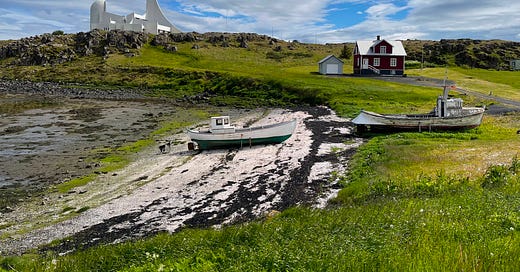




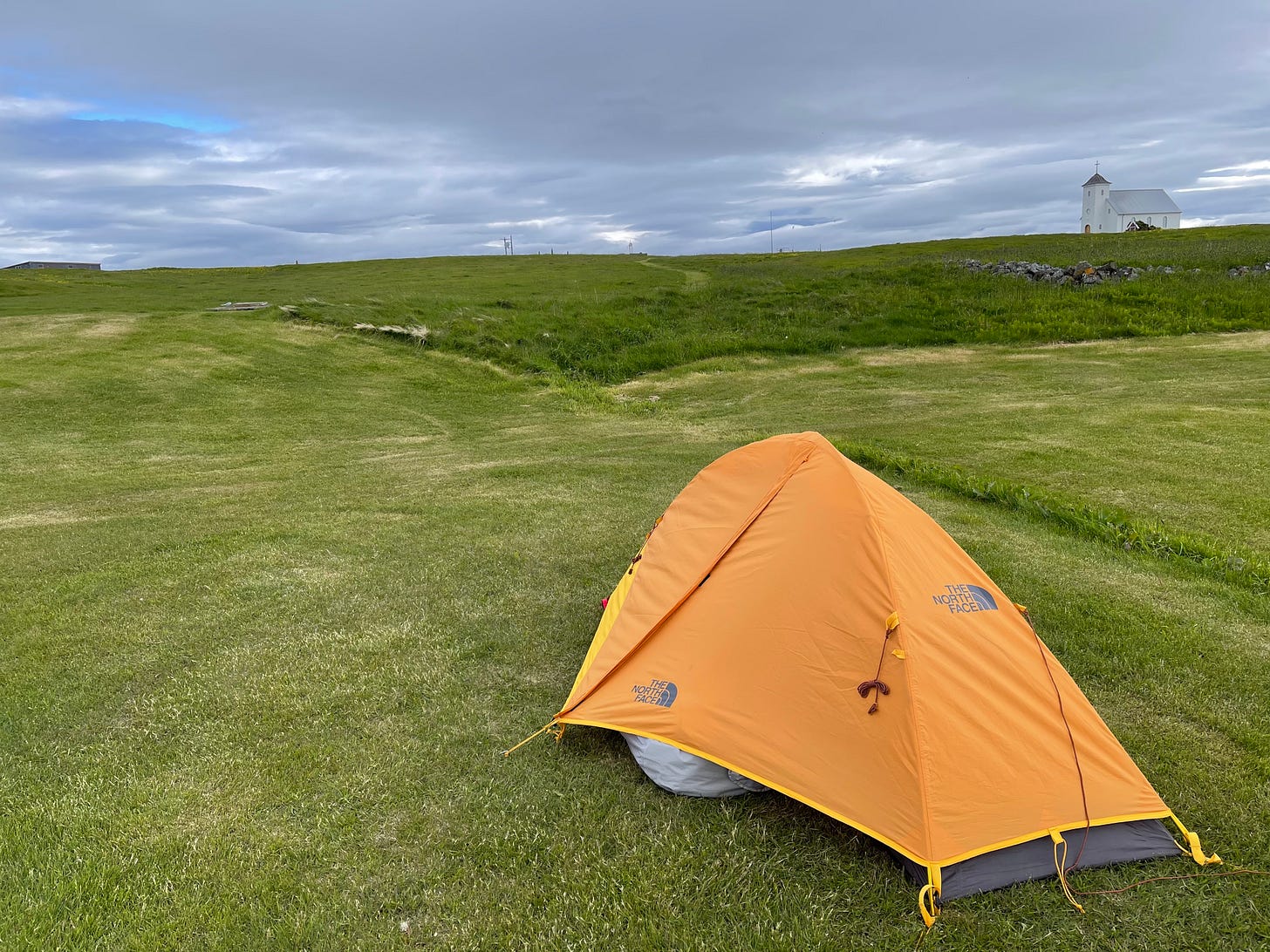
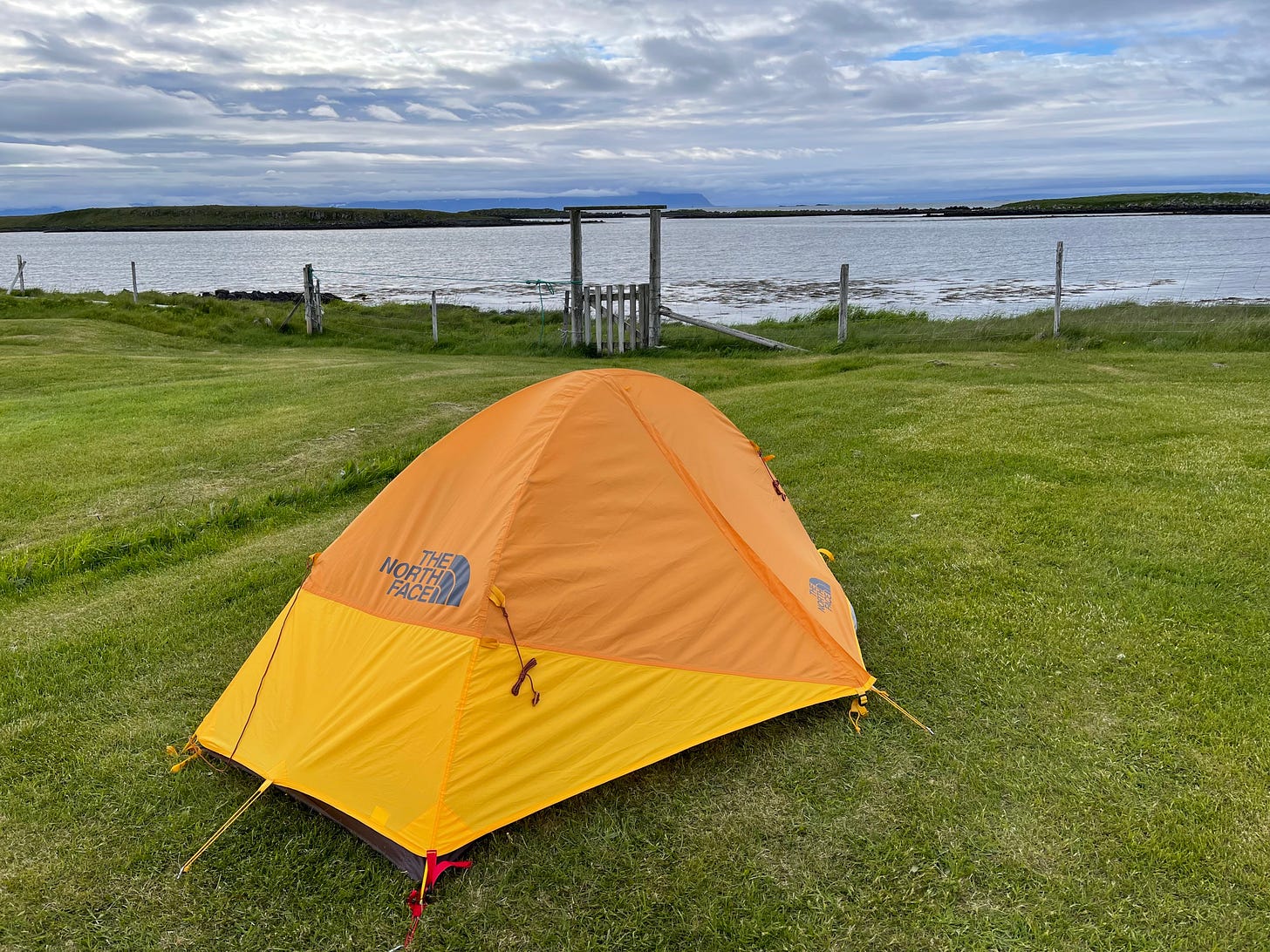
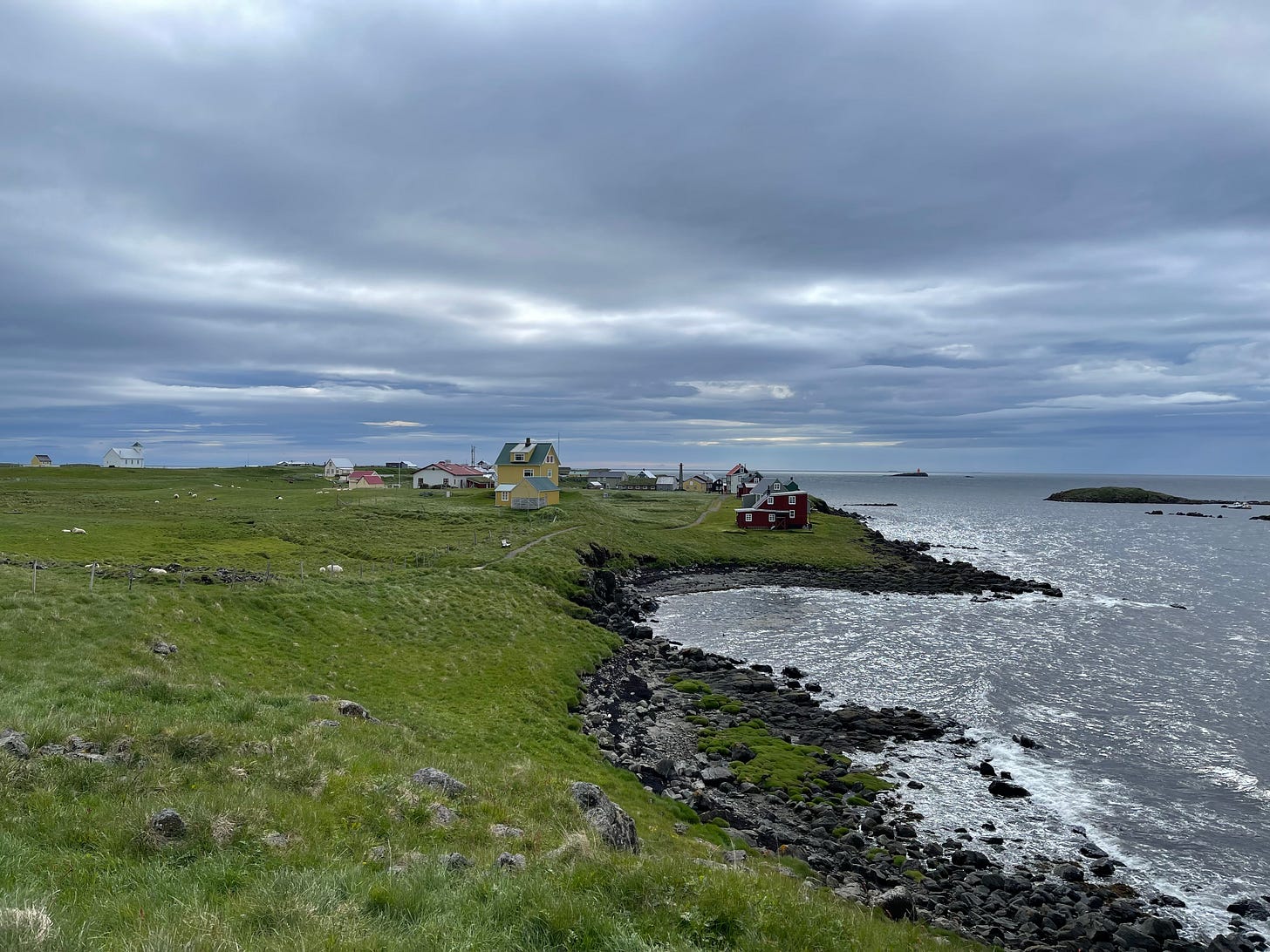
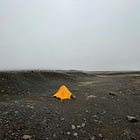
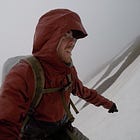

So many things I love about this Garrett - thanks for writing it.
First - the pictures - beautiful
Second - the end quote from stephen bachelor
Third - the really insightful question you left at the end. i definitely fall under the error of neuroticism, and part of me fantasizes about the error of naivete.... maybe there's a bit of "grass is greener" going on, but at the same time, it's just looks to invite more variety in life. what do you think?
lol the first footnote.